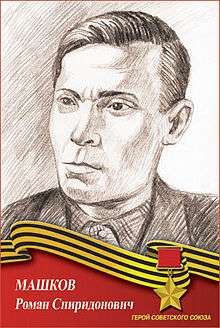Roman Mashkov
| Roman Mashkov Russian: Роман Спиридонович Машков | |
|---|---|
 The modern handbill | |
| Born |
September 24, 1922 Bolshiye Goly in Irkutsk Oblast, USSR[1] |
| Died |
July 22, 1971 (aged 48) Novokhopyorsk in Voronezh Oblast, USSR[1] |
| Allegiance |
|
| Service/branch | Military intelligence of Red Army in World War II[1] |
| Years of service | 1942–45 |
| Rank | Lieutenant |
| Unit | Commander of the intelligence platoon of 5th motorized infantry brigade of 5th Tank Corps, 2nd Baltic Front |
| Battles/wars | Attack to railway station Ērgļi[1] |
| Awards |
|
| Other work | Was engaged in country work in collective farm[1] |
Roman Spiridonovich Mashkov (Russian: Рома́н Спиридо́нович Машко́в) (September 24, 1922 – July 22, 1971) was the commander of an intelligence platoon in World War II, Hero of the Soviet Union.
Biography
Roman Mashkov was born on September 24, 1922 in Bolshiye Goly village of Kachugsky Municipal District of Irkutsk region, Russia in a family of the Russian peasant. After the termination of seven classes of school he worked in collective farm. In October, 1941 the novel is called in Red Army in airborne troops, and since April, 1942 it has arrived in I operate army.[1]
It served as the commander of an intelligence platoon of 2nd Baltic Front where has caused a stir in fights on the clearing of Latvia. On August 21, 1944 the mechanized infantry battalion in which Mashkov served, under command of major Dityuk participated in attack to railway station Ērgļi, then in Madona Municipality of Latvia, now Ērgļi municipality. On August, 22 the battalion has appeared cut off from the basic forces of a brigade.[1]
On one of sites of defense the group of eight soldiers under command of lieutenant Mashkov has beaten off some enemy attacks, having destroyed thus tens soldiers of German army. The commander personally fired from a mounted machine gun. After that the group was successfully forwarded through lake on which other coast has incorporated to the armies. Mashkov has given the information on an arrangement of German soldiers and artillery.[1]
Later the commander of a battalion has allowed a command to Mashkov to make some prospecting sorties. In one of them he has found out a staff of a German division. Having collected group of scouts, it has made a touch on a staff. As a result, Moshkov has grasped enemy documents and has killed the commander of a division. Moshkov has played an essential role in preparation of an exit of the battalion from an environment and acceptance of the correct decision on break of enemy defence: it delivered to the commander of a battalion the prospecting data about weapon emplacements of the opponent.[1]
For it to Moshkov the rank of the Hero of the Soviet Union has been appropriated.[1] Throughout war it was four times wounded, and each time after treatment again came back to front. Roman Mashkov in a Russian Victory Day was in Berlin.[2]
 |
Russian: за мужество, отвагу и героизм, проявленные в борьбе с немецко-фашистскими захватчиками, лейтенанту Машкову Роману Спиридоновичу присвить звание Героя Советского Союза с вручением ордена Ленина и медали «Золотая Звезда» (№ 8936) decree of Presidium of the Supreme body of the USSR from March 24, 1945[1] |
After World War II Moshkov has been transferred to the reserve, worked in his native collective farm "Second Pyatiletka". After the retirement Moshkov has moved to the city of Novokhopyorsk in Voronezh Oblast where has died on July 22, 1971.[1]
Moshkov has been awarded by order of Lenin and a «Gold Star» medal (№ 8936) and medals.[1] In 1965 there was Leonid Sandalov's book "the Difficult boundaries" (Russian: Трудные рубежи), one of which heroes is Roman Mashkov.[3] In the central memorial of the city of Novokhopyorsk devoted to a victory in World War II the memorable bust of the Novel of Moshkov is established[2]
References
- 1 2 3 4 5 6 7 8 9 10 11 12 13 "Roman Mashkov". Герои страны ("Heroes of the Country") (in Russian).
- 1 2 Из истории земли Новохоперской. Из воспоминаний Г.К.Жукова (in Russian). Одна на всех победа. Retrieved 2009-11-12.
- ↑ Leonid Sandalov (1965). Трудные рубежи. Moscow, Russia: Voenizdat. Retrieved 2009-11-12.
